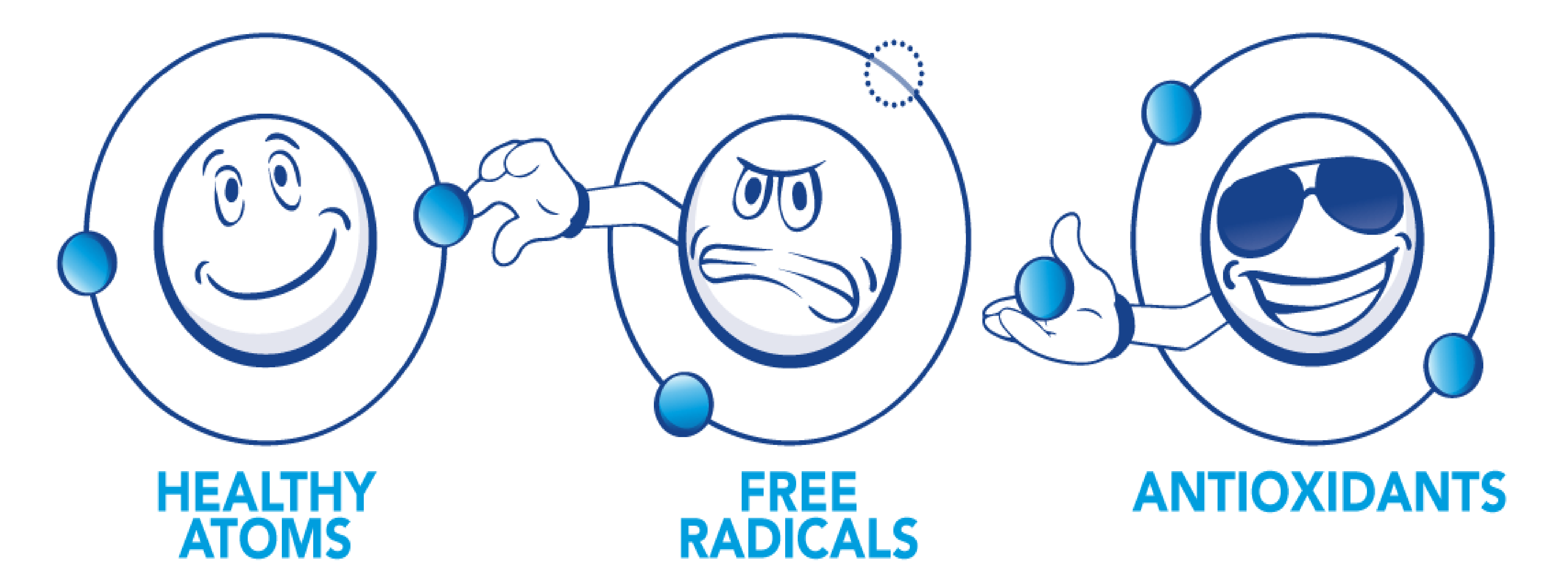The Truth Behind Antioxidants: What Big Pharma Doesn’t Want You to Know

Almost forty years ago, in the summer of 1981, Richard Doll and Richard Peto, epidemiologists working at Oxford University published a major paper in the science journal Nature that took the medical world by storm. Investigating multiple studies and clinical trials involving cancers of the lung as well as heart disease, they compared components in the blood plasma of those with the disease against those that didn’t. The results were unmistakable: In the blood of the healthy patients without lung cancer, there were high levels of ß-carotene, whereas in patients suffering from lung cancer, the levels of ß-carotene were low. Likewise, patients without heart disease had a higher level of Vitamin E than those that had heart disease.
The correlation seems obvious – ß-carotene and vitamin E, both antioxidants, must prevent cancer and heart disease, right? This was the conclusion which nutritionists and pharmaceutical companies at the time came to. Within years they had successfully developed a large market for antioxidant supplements, an evidently profitable business which has earned them millions, and is still ongoing today. But are antioxidants really good for your health? This article explores both the science and statistics behind this phenomenon, and why sometimes things just don’t turn out the way you want them to.
What actually are antioxidants?
In chemistry, an antioxidant is a reducing agent. This means that it is capable of causing reduction, the gain of electrons, to a chemical species. In other words, because reduction can only take place simultaneously with oxidation, the antioxidant itself is oxidised in a reaction, reducing the other reactant in the process.

In biology, antioxidants are important because they can prevent the process of oxidisation in tissues and cells, which can be very harmful. By being oxidised in place of the vulnerable organic tissue, they prevent any damage which can be done.
This is the theory behind why many people believe antioxidants are beneficial to your health – the “free radical theory of aging”. The theory suggests that free radicals produced in our bodies, which are very reactive chemical species possessing an unpaired electron, are responsible for the damage of cells and tissues, which over time lead to a cumulative consequence of ageing and senescence. Logically speaking, the theory makes a lot of sense. Free radicals oxidise cells and tissues, as well as causing chemical damage to the DNA of cells. The role of antioxidants are therefore to react with these free radicals to neutralise them, preventing them from damaging our cells and DNA.
So why isn’t everybody taking antioxidant supplements and living long, happy lives? There is a catch, of course. The underlying issue here is why we even produce these free radicals in the first place. Why do we still produce these harmful substances in our body even after millennia of evolution? The answer is that free radicals are actually an important part of many vital mechanisms for sustaining life. Free radicals are used by phagocytes in the immune system to kill bacteria, the moderation of cell growth and division, as well as in the signaling between cells. The truth is that in reality, things are always more complicated than they seem. The body is a complex machine with many mechanisms which are intertwined in ways which may not be immediately obvious. To blindingly apply a simple solution to a complex problem which is still not yet understood is nothing short of a recipe for disaster, as we will see shortly.
The evidence against antioxidants
Following the study published by Doll and Peto, many clinical trials took place to investigate the effects of antioxidant supplements. These are the two studies which were the most notable:
The first study was a clinical trial held in Finland, 1994. 30,000 participants which were in high risk of lung cancer were given combinations of vitamin E, ß-carotene, both or neither. This was randomised and placebo-controlled (some people were given sugar pills with no effect, under the belief that they were taking supplements) for a fair result. The results showed that not only do the supplements not reduce risk of cancer, they actually increase the risk of lung cancer and heart disease!
The second study was even more dramatic: known as the “Carotene and Retinal Efficacy Trial”, or “CARET”, it was a similar large scale clinical trial involving 18,000 volunteers that were at high risk of cancer (smokers and asbestos workers) and published in 1996. However, before it could even reach its intended duration of 6 years, the trial had to be terminated early as too many people were dying – those taking the antioxidant tablets were 46% more likely to die from lung cancer, and 17% more likely to die from any other cause.
Many more trials have since been conducted, with very similar results – all showing that antioxidants actually increase risk of disease and death. However, these results turned in long after companies had started manufacturing and selling antioxidant supplements, which remained at large to ignorant consumers. While awareness of antioxidant supplements is greater today, it is still important to be careful when purchasing such products, especially because the FDA does not regulate dietary supplements, meaning that it is difficult to tell whether or not any supplement is safe or effective.
The evidence for antioxidants
So what about that trial at the start of the article? While it is the only study which gave a positive result, it is still relevant to the argument. Why is this the case? I believe that the answer lies within the distinction between correlation and causation. Just because there is a high antioxidant level in the blood plasma of healthy people is not to say that consuming antioxidants lead to good health. Rather, it is a byproduct of a healthy lifestyle. Many foods which contain antioxidants such as berries, almonds, carrots, and tomatoes are fruits and vegetables which are also high in fibre and other nutrients. Consuming healthy food in regular meals will lead, naturally, to a high level of antioxidants in the blood as a consequence. Taking pure antioxidant supplements just for the sake of it doesn’t involve the consumption of other nutrients which are found in antioxidant high foods, which only leads to negative effects on health, as we have seen previously.
Likewise, many surveys of the consumers of such supplements (which to be fair are not strict trials) often come back with positive results. In this case I believe there is bias associated with the survey itself. Anyone who purchases dietary supplements and cares enough to enter a survey will naturally be very conscious of their health. As a result, the survey would be biased to appear positive simply because it is taken from a limited sample population containing mostly healthy people anyways, regardless of the effect of their antioxidant supplements.
The point I am trying to make is that it is always important to take into account experimental procedures as well as any sampling biases in any sources used, especially when people are involved. There are many factors at play which can be impossible to control, some of which can influence the results directly.
Conclusion
While many of us (myself included) would love to take shortcuts, it is important to appreciate that the most effective path to good health is also the most straightforward one: Maintaining a nutritious diet and doing enough exercise instead of relying on dodgy supplements will get you pretty far in life.
I would like to give special credit to Dr Ben Goldacre for this article, as the majority of the content and sources I have found are from his book Bad Science.
